Throughout the past 35 years of turbulent and triumphant times in Israeli and Jewish Australian history and current affairs, the ebbs and flows of communal life, and constant technological and societal change, one calm, reassuring and trusted voice has been a constant on SBS Radio’s Hebrew and Shalom Australia English programs.
With its distinctive, vivid, Israeli-Australian accent, that voice has updated, informed, connected and entertained us.
It is the voice of Sydney’s Nitza Lowenstein.
Last month, SBS Radio celebrated her 35th anniversary as an esteemed, admired and highly professional broadcaster, journalist, executive producer and host of the program, which goes to air nationwide from 11am to 1pm every Sunday.
But as Lowenstein told The AJN, when fondly reflecting on that remarkable milestone achievement, her first week on the airwaves was truly an experience of diving straight into the deep end, in your first swimming lesson, with no floaties on!
Lowenstein first applied for the job in 1986, upon spotting an advertisement in The AJN (then called the Australian Jewish Times) for a Hebrew program broadcaster by SBS-run, language-based radio station 2EA.
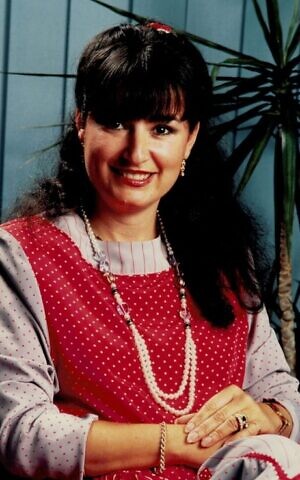
“I didn’t have much experience or knowledge of journalism, but I had a masters degree in Hebrew, and I’d always been a good public speaker, so I thought to myself, let’s seek a challenge,” Lowenstein recalled.
It turned out the position only became available in 1988, so she reapplied, and was the successful candidate, following a rigorous selection process of tests and interviews, and even a meeting with Jewish communal leaders.
“You know, I hadn’t been into a studio before, or spoken into a microphone … well, only at bar mitzvahs,” she said.
“So when a senior SBS manager rang me on a Monday night, to tell me we’d like you to start on Wednesday – as the program was then on Wednesdays, Fridays and Sundays – I told him, but I haven’t had any training yet!
“He just said, ‘When we interviewed you, we saw that you’re capable – you’ll manage’.”
She did, and has thrived on the airwaves since, embracing the new technology that’s become available in the digital age.
“My philosophy is to embrace change, because if you’re stagnant, you’ll become obsolete.”
As the only Hebrew language program on Australian radio, Lowenstein says it is popular with Israeli expats, who are anxious to find news about Israel, and to learn about Australian society and the Jewish community.
From her start in 1988 and throughout the 1990s, Lowenstein remembers having a pigeonhole to receive staff memos, using hand signals to a panel operator through a panel of soundproof glass, and the laborious editing process of using scissors to cut reel-to-reel tape.
“I got my first computer in 1994, and there was still no internet then.
“Before I interview anyone, I always like to know something more about them, or what they do, so I Google search, but back then, I’d have to go the library to look things up in the Encyclopaedia Britannica!
“I remember doing that before I interviewed Holocaust survivor and Nobel Peace Prize winner Elie Wiesel in person, using a very primitive cassette player recorder that was horribly noisy.
“Well, a few weeks ago, to celebrate my 35 years at SBS, I took that recorded interview, edited it with the new technology available in the studio, and played it on the program.
“And I was amazed to discover that all the questions I’d asked him about the issues that worried us back in 1988, and all his answers, are still as relevant in 2023.”
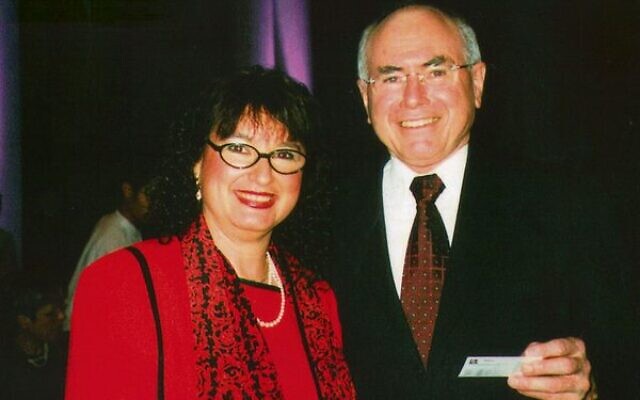
Three decades on, Lowenstein enjoys being able to do everything independently at the touch of a button, and using sophisticated editing tools “that enable you to strive for perfection”.
“Whenever I hear Aussie ‘ums’ and Israeli ‘ehs’ in recorded interviews, I take them all out!”
The digital era also enables her program to not only be heard on the weekly 11am Sunday radio slot, but in the form of podcasts, and via social media platforms, not just in Australia, but around the world.
“And it receives thousands of hits.”
Her show starts with a Hebrew hour that includes a news bulletin, features, interviews and Israeli music. That’s followed with an English hour that begins with an interview of an AJN journalist about the latest Jewish news, and continues with features, interviews, a Yiddish report and Yiddish music.
A report from Jerusalem is also aired fortnightly, in Hebrew and English.
As the only Hebrew language program on Australian radio, Lowenstein says it is popular with Israeli expats, who are anxious to find news about Israel, and to learn about Australian society and the Jewish community.
The program is also “something that unites the Jewish community, from the east coast to Perth, who know they’ve got a trusted media outlet that gives them reliable news”, about health and Jewish education, to the arts, antisemitism, business, Judaism, and everything in between.
Asked what the secrets are behind the program’s success and longevity – and her own as its host and executive producer – Lowenstein said there are several key factors.
“First of all, if you do a monotonous job and keep everything the same, you cannot last in radio.
“So I try to provide absolute variety in programming, and also in the talent – the people who I interview – who bring colourful and different points of view, and contribute to society in different areas.
“I also try to make sure that the news presented is impartial.
“Nobody knows if I have any political opinions, because I completely desensitise myself [in the program] – especially when it comes to the Middle East … and I’ve [covered] quite a few wars.
“I always see myself as a vehicle to bring other voices to air.”
That approach is essential, because her Jewish audience includes listeners from the right, middle and left side of the political spectrum.
And the listenership extends to non-Jews who are keen to learn more about Jewish culture and tradition, as well as Arab-Israelis – and even Palestinians from the West Bank and Gaza – who have migrated to Australia, can speak Hebrew, and “have phoned me to say thank you for the program, we love it”.
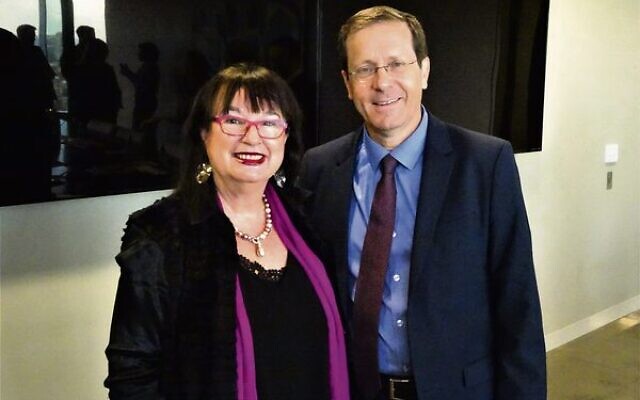
Lowenstein has conducted thousands of interviews, and says, “Regardless if I interview a prime minister, a professor, a shop owner, a student, a volunteer, or a grandmother, everybody gets the same respect from me”.
“I don’t interject them … I feel every single person I interview has a story to tell, and advice to give.”
High-profile interviewees that stand out in her memory are current Israeli Prime Minister Benjamin Netanyahu and President Isaac Herzog.
“I [first] interviewed Netanyahu when he came to Australia in 1990 as Israel’s ambassador to the United Nations, and I was very impressed.”
“I still remember what he said to my listeners – ‘Would the Australian government sit on their hands if Sydney was bombed?’.”
Herzog, she said, “I know very well, and met him [last] when he came to Australia before the pandemic, as head of the Jewish Agency … and I was taken aback to see how humble, intelligent and wonderful a person he is.”
During the COVID lockdowns, Lowenstein included talkback radio segments and received calls from many people “who were really hurting and lonely”.
“I always see myself as a vehicle to bring other voices to air.”
“One listener from a non-Jewish retirement village in Brisbane phoned in, and said it was really important for him and his wife to have kosher wine for kiddush, and they felt very depressed because they couldn’t get it.
“Somebody heard that call, and what eventuated was a welfare group in the Brisbane Jewish community saving the day.
“So I feel we did something really important, connecting Jews around Australia during COVID, via radio.”
Lowenstein also aims to promote harmony and understanding in the community, and include different perspectives, and chooses not to shy away from any topics.
“I’ve interviewed a [Jewish Australian] gay couple that [were able to finally] get married after 40 years of being together … I’ve interviewed Orthodox rabbis – including Kosher Sex author Rabbi Shmuley Boteach, who pioneered a revolutionary approach to sex, marriage and personal relationships drawing on traditional Jewish wisdom, and I’ve interviewed people about drug addiction, and staff from Jewish House about how they help people who are being abused in a marriage.
“I want to help the community see a broad spectrum of what is happening around us, and not to see the world in pink glasses.”
At SBS Radio, Lowenstein is proud to have colleagues and friends “from every corner of the world”.
One of them shares her first name, “but it is spelled with an ‘s’ instead of a ‘z’ because she is Greek”.
“We [SBS radio staff] always treat each other with respect and understanding, because we’ve got a common bond, and that’s our new homeland, Australia.”
While her work for SBS is her main job, Lowenstein was appointed a marriage celebrant in 1995.
She has presided over more than 1400 civil weddings, for couples from different cultures and backgrounds, and makes it her focus to include and explain traditional rituals and customs into each ceremony.
Lowenstein also works as a public speaker, delivering Powerpoint-based lectures on all sorts of timely topics.
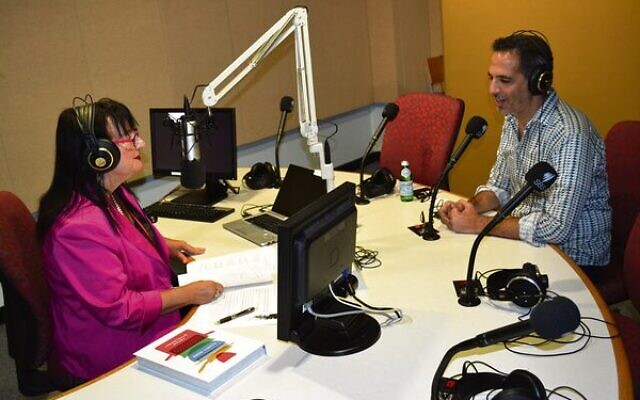
That began for her at Montefiore and other community organisations, “to give something back”, and now extends to delivering talks at the University of the Third Age, and on cruises to international destinations.
When asked how she is able to keep energised and motivated while continuing to do three different jobs, after all these years, Lowenstein shrugged and said, “I’ve never really thought about it, but it’s just being efficient with your time, and also, with everything moving so fast , you need to have stability at home – that’s so important”.
“My husband Arthur and I got married in South Africa, we came to Australia [in 1978] and we have three adult children – and he has been my backbone.
“He said to me, ‘Nitza, you are capable of doing anything you want to do’.”
With 35 years of radio broadcasting under her belt, Lowenstein is not showing even a trace of losing her passion or drive, nor her commitment to her listeners.
Yet she acknowledges that nobody knows what’s around the corner, and feels grateful to have the opportunity to still do what she loves.
“There’s a well-known quote, sourced from Jewish tradition, that only stupid people can predict the future,” she said.
“You can hope, but you cannot predict, so I’ve got good hopes, and I always see the half-full cup, even when things are tough.
“You know, when you are working for 35 years in a newsroom, reporting about the Middle East, you see and hear about so much misery.
“But in my work as a marriage celebrant, I always get to see the happy side of life, and that gives me balance.
“So I believe there is always something out there to be hopeful about, and rejoice in.”

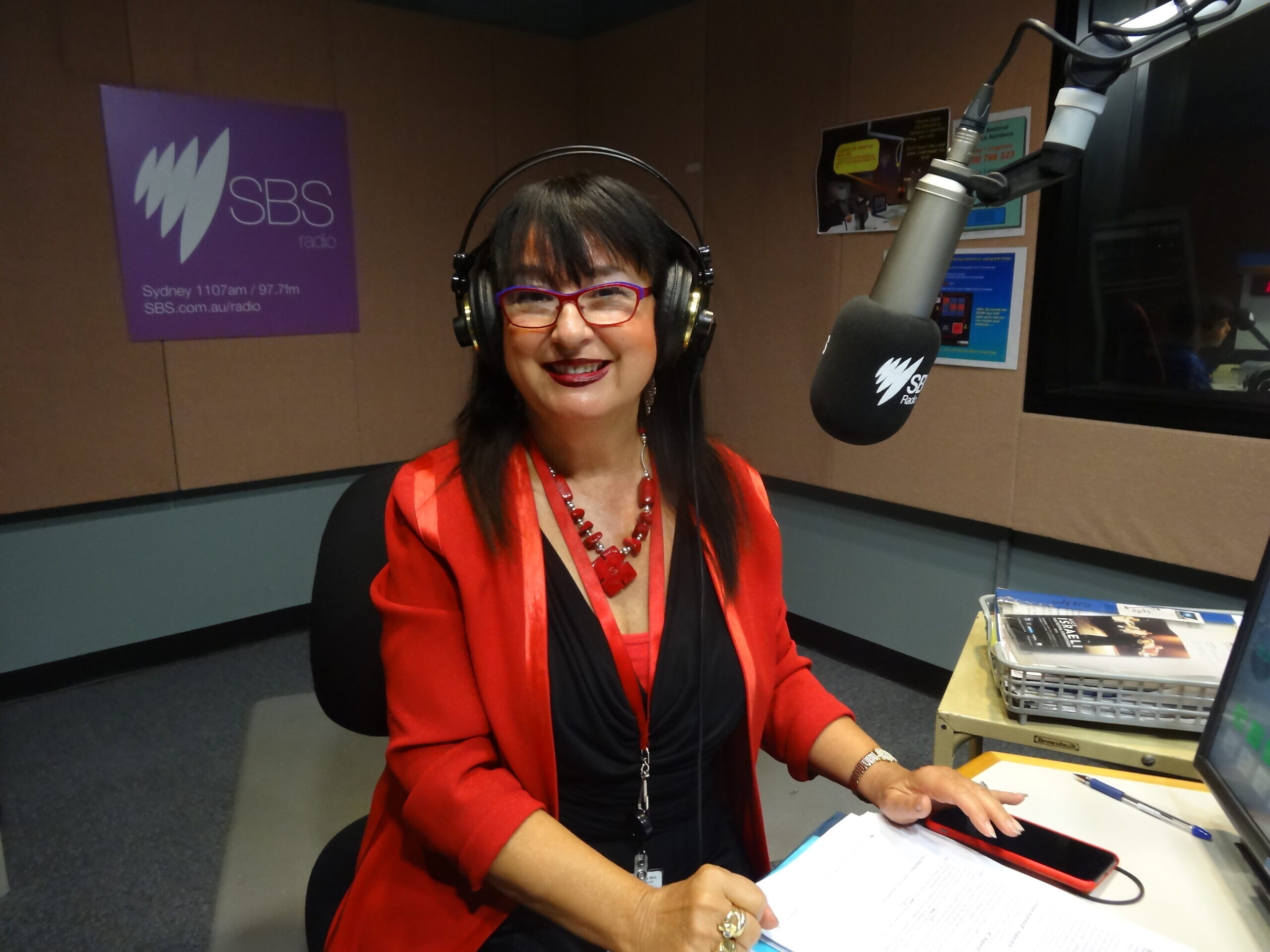
comments